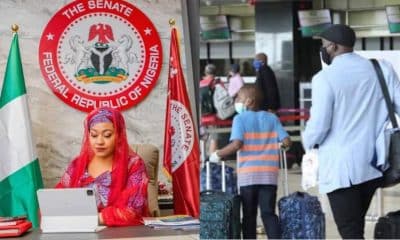Nigeria News
Lawyer Reveals How Nigerians Can ‘Japa’ With Dependants To UK

In light of the recent policy change by the UK Home Office, a United Kingdom-based immigration lawyer, Femi Aina, has provided valuable insights for Nigerians wishing to travel to the UK with their family members.
The new policy, which came into effect on January 1, restricted Nigerian students and other overseas students from bringing dependants via the study visa route.
The Home Office’s announcement has drawn significant attention, particularly with its decision to exempt only postgraduate research or government-sponsored scholarship students from this development.
This move aligns with the UK’s objective to decisively cut migration numbers. As the Home Office stated, “From today, new overseas students will no longer be able to bring family members to the UK.”
In response to these changes, Femi Aina, in an interview with Punch, outlined alternative migration routes for Nigerians.
Recognizing the challenges posed by the new policy, Aina suggested that applicants should explore options beyond the student or skilled worker categories.
One viable alternative, according to Aina, is the investor route, which may offer a pathway for Nigerians to travel with their dependants. This option can be particularly suitable for those with the requisite financial resources to invest in the UK.
Additionally, Aina highlighted the potential for Nigerians with family members who are European Economic Area (EEA) nationals to utilize a family permit.
This route could facilitate relocation to the UK with loved ones, circumventing the restrictions imposed on the study visa route.
Aina’s advice comes at a crucial time for many Nigerians who have been affected by the Home Office’s policy shift. His expertise sheds light on the complexities of immigration laws and offers alternative solutions for those aspiring to migrate to the UK with their families.
This development underscores the evolving nature of immigration policies and the need for prospective migrants to stay informed and consider multiple pathways when planning their journey.
He said, “Applicants should consider an alternative route to migrate than going as a student or skilled worker. Those planning to go need to consider how long they want to be separated from their family.
“Some can consider the investor route as an alternative, some may consider a family permit if they have a family member who is an EEA national.”
Aina disagreed with claims that the ban might be targeted at Nigerians who have been deserting the nation in droves because of the japa syndrome, saying it was for political reasons aimed at keeping the Conservatives in power.
“I won’t say it was targeted at Nigerians because, under the Equality Act 2010, it is against the law to discriminate against people on the basis of nationality. I will say it was done for political reasons so that the Conservatives will remain in power.
“Because the indigenous population is concerned about migrants influx, which is having a negative effect on resources. So, if action is not taken, the Conservative will lose the next election,” he stated.
Aina expressed concern that many Nigerians would be affected by the policy “because they will not be able to bring in their dependants,” saying the worst was that families would be separated.
He said, “For instance, a wife in the UK, husband and children in Nigeria. If care is not taken, allegations of infidelity will surface, which will lead to family separation.
“Under international law, nations are under obligation to promote family life. The UK government’s new immigration law has an implication on family life. The UK government is aware; that is why they said that they will consider exceptional circumstances on a case-by-case basis.”











